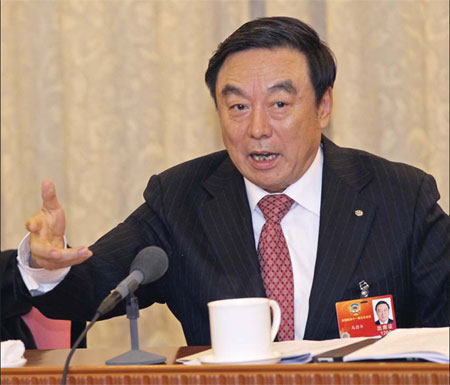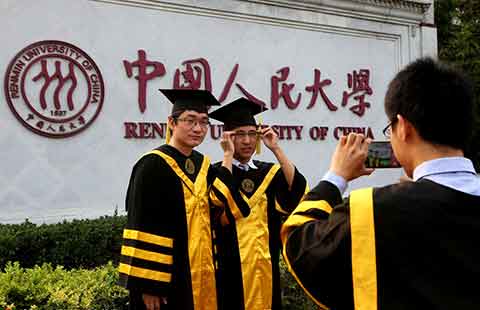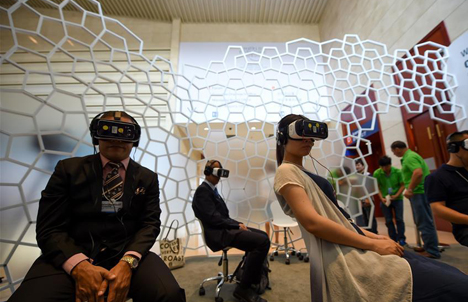Navigating the future
By Zhang Chunyan (China Daily) Updated: 2012-09-07 10:27
|
China Merchants Bank President Ma Weihua says IT is a precious gift to banks. Provided to China Daily |
Innovation, excellence help nation's top private bank steer past the financial turbulence
Though dark clouds are looming over the global financial landscape, Ma Weihua believes that there is still light at the end of the tunnel for enterprises that have "innovation" as their calling card.
Obviously Ma knows what he is talking about, as his obsession with innovation and excellence has not only helped the Shenzhen-based China Merchants Bank become the sixth-largest lender in China in terms of assets, but also notch up a satisfied clientele in China and abroad, along with several awards for excellence and customer service.
But that is not all. These days Ma is more seen championing the spirit of entrepreneurship in China, particularly among private enterprises.
Ma was recently part of the 30-member delegation headed by Liu Chuanzhi, Chairman of Legend Holdings and the China Entrepreneur Club, that visited UK at the behest of British Prime Minister David Cameron.
The soft-spoken Ma says that the UK trip was a journey of fulfillment and communication. He says the visit went a long way in boosting trade ties between Chinese and UK companies and also provided an opportunity to showcase the real image of Chinese entrepreneurs.
The bank is also hoping to cash in on the global outreach moves of Chinese enterprises. "As more Chinese companies go abroad, we will strengthen our 'follow services' for customers."
CMB was listed in Shanghai and Hong Kong in 2002 and 2006, to augment its capital base and further its global moves. In 2008, at the height of the global financial crisis, it set up a branch in New York and ended the restriction on Chinese banks setting up branches in the US. The CMB New York branch was compared to a "breeze in the winter of the Wall Street" by Michael Bloomberg, former mayor of New York City.
In 2008, CMB also acquired Wing Lung Bank, the fourth-largest bank in Hong Kong. The renovated bank has started to perform well and the takeover has been described by the Financial Times as "a case that cannot be copied".
In the overseas market, CMB has two fully-owned subsidiaries - Wing Lung Bank Ltd and CMB International Capital Corp Ltd, with one branch in Hong Kong, a branch and a rep-office in New York, and two rep-offices in Taipei and London.
According to the Financial Times, CMB topped the global bank list with the highest book value in 2010. In July 2012, the bank, as a new entrant, ranked 498th on the Fortune 500 list of big global companies.
When it comes to Europe, Ma says, "Europe is one of CMB's key internationalization areas with many top international financial hubs like London, Zurich and Frankfurt."
"Despite the eurozone debt crisis, Europe still remains an integral player in the global landscape and has good business and trade relations with China," Ma says.
"We will size up the situation prudently and announce our timetable when appropriate."
With more Chinese banks now ready to enter the European market, CMB hopes that its differentiation strategy will help it stay ahead of its peers. More importantly, CMB has a master helmsman in Ma to navigate the ship through the troubled waters of Europe.
"During the trip, British Trade and Investment Minister Stephen Green introduced me to the PM Cameron as 'China's most excellent banker'. The prime minister in his response remarked that, 'our banker (Stephen Green) has already been a minister'."
Green, the former boss of HSBC, now has a ministerial role in the British government. But unlike Green, who moved from banking to government, Ma had a wealth of experience in various government posts before taking the helm at CMB.
In the 1980s, Ma served in the Liaoning Provincial Planning Economy Commission as deputy section director and deputy secretary-general. Later on he was moved to the general office of the Liaoning provincial government and then on to the general office of the Anhui provincial government.
Between 1988 and 1998, Ma worked in the People's Bank of China, the central bank, as deputy director of the general office, deputy director of the Planning and Cash Department, president of the Hainan Provincial Branch, and director of the State Foreign Exchange Administration's Hainan branch.
Ma says his wealth of experience in various government capacities helped him hone his skills in financial services, particularly bank management.
In 1999, Ma became the president of CMB, a lender set up in 1987 and the first commercial bank fully owned by corporate legal entities in China.
Ma, regarded as the most innovative banker in China, however, says "innovation is one of our core values and an important factor for our sustained development".
During his recent trip to the UK, Ma says his main purpose was to understand the spirit of innovation in British enterprises. "What impressed me the most was the innovation at the Virgin Group and the Cambridge technology company ARM Holdings," he says.
Though the modest chairman does not talk much about his or CMB's own pursuit of innovation, in the last 10 years the bank has undoubtedly taken the pole position for excellence in the financial sector.
The Shenzhen-based lender was the first bank in China to make extensive use of information technology to set up a nationwide banking IT platform and also the first to extensively make use of telephony in banking.
The real success for the bank came from the All-in-One Card, the first bank card based on customer numbers, and the All-in-One Net, China's first online banking platform.
The better online and telephony services have helped the bank achieve considerable reductions in overall workloads and manpower efficiency. During the first six months of last year, nearly 47.8 percent of the general over-the-counter services and 85.4 percent of retail banking services were completed online or by telephone.
"In 2002, we issued the first dual-currency credit card compliant with international standards and so far, more than 39 million such cards have been issued."
The card venture brought global fame to the bank after it was included in the MBA case studies of Harvard University.
CMB also became the first Chinese joint-stock commercial bank to provide private banking services, which also won it the "Best Private Bank of China" accolade. Its inter-bank cash management service was the first of its kind in Chinese banking industry, making it the preferred choice of large enterprises for fund management.
Ma was named the "Star of Hope 2004" by the English magazine Banker and was the first Chinese banker to win such a title. The magazine stated that, "Most of the Chinese bankers are low-key bureaucrats unfamiliar to those outside the industry. But Ma is an exception. He is the best marketing weapon of China Merchants Bank, which has become the best and most reformed bank in China."
But the modest Ma says that along with innovation it is the differentiation strategy that has helped CMB steal a march over other banking peers in China. Elucidating his claims, he says that Sunflower Finance now provides services to more than 780,000 customers. The service, which requires a minimum of assets of 500,000 yuan ($78,700, 62,800 euros) at CMB accounts, is China's first financing product for high-end customers.
In 2004, CMB sparked an industry transformation with its innovative business strategy. By stepping up efforts to offer retail, fee-based and SME banking services, CMB managed to carve out a distinctive pattern of development for financial lenders.
The bank is also the leader among joint-stock commercial banks in terms of personal savings deposits, personal consumer lending, asset custody, corporate annuity, and offshore financial business. Its risk management has been rated one of the best in the industry along with its high-quality assets.
To a certain extent, innovation also embodies Ma's foresight. Unlike other big lenders in China, Ma says, "CMB's biggest advantage is the judgment on the future, which means 'a bit earlier, faster and better'."
"One cannot judge the present without foresight, or deal with micro issues without a macro view, or understand China without a global vision," he says.
"These days the topic that I talk about most is understanding China's economic slowdown."
In March, Beijing cut its growth target for the whole of 2012 to 7.5 percent. There are some fears of a hard landing in China's economy and its subsequent impact on the rest of the world. "There is an objective necessity for China to transform its economy. Banks will face several challenges due to the economic transformation," Ma says.
But his foresight into the situation goes even further than that. Though CMB was one of the first lenders to offer credit cards to its customers, it has now embarked on a new goal of "replacing the credit card" as mobile payments are gaining in popularity.
"In an era of technology revolution, we should have enough foresight to stay ahead in the payment revolution," Ma says.
The seasoned banker says IT is "air" and a "precious gift" for banks, while "new technology gives banks revolutionary breakthroughs and pleasant surprises".
According to Ma, by the end of June 2012, nearly 7 million users had subscribed for the CMB mobile banking services, which offers iPhone, Android and other Web-version mobile banking platforms. The bank intends to extend the network soon to cover all mid-to-high-end smart phone users.
Even as the bank is looking to grow its business in China, it is also taking steps to spread its wings in overseas markets. Ma says to achieve global success it is important to have an efficient and interconnected cross-border network. "The advantage of such a system is that CMB can give full play to its cross-border financial advantages, enhance global reputation and lead the financial service sector."
zhangchunyan@chinadaily.com.cn
- Leading game developers turn to virtual reality
- Uber eyes smaller cities, investment to take on rival: CEO
- China's inflation growth likely to slow in June: Report
- Huawei's $1.73b investment in UK to go ahead despite Brexit vote
- DSM sees healthy growth in Chinese market
- Novo Nordisk eyes technology tie-ups
- China's P2P lending sector faces risk control challenges
- VW to fork out $15b over cheatings



















